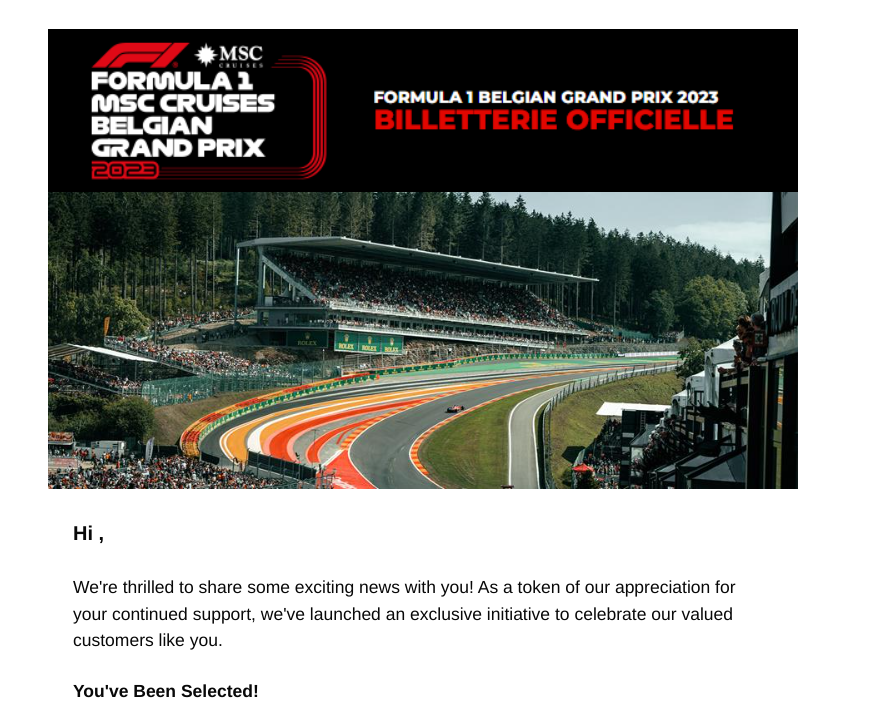As thousands of fans descend upon the legendary Spa-Francorchamps circuit for the 2025 Belgian Grand Prix, the Formula 1 paddock finds itself in the crosshairs of sophisticated cyberattacks targeting both race teams and the global F1 fanbase.
While the spectacle on track remains a highlight of the season, a parallel race quietly unfolds online, where cybercriminals seek to exploit Formula 1’s surging popularity and its reliance on complex technical systems.
Target Formula 1’s Major Summer Event
Formula 1 is a data-centric sport, with each team generating terabytes of telemetry including live tire temperatures, engine maps, fuel loads, and vehicle setup data to drive split-second race strategy decisions.
This data, representing valuable intellectual property and performance secrets, has consistently made team networks lucrative targets for advanced persistent threats (APT) and ransomware groups.
In recent seasons, leading teams such as McLaren, Mercedes-AMG Petronas, Red Bull Racing, and most recently Ferrari have reported breaches ranging from network intrusions to the theft of sensitive engineering blueprints and internal documentation.

Beyond the paddock, cyber threats have proliferated in the run-up to the Belgian Grand Prix, with a surge in phishing campaigns preying on unsuspecting fans.
In March 2024, attackers compromised the race’s official contact email a trusted communication channel for fans seeking tickets and event details.
According to a CloudSek report, the resulting phishing campaign involved fraudulent tickets and personal data requests, delivered under the guise of discounted offers or exclusive event access.
Social media platforms, too, have been swamped by impostor accounts offering fake giveaways for merchandise, tickets, and paddock experiences.

In one high-profile scam, a counterfeit McLaren-themed Instagram account drew hundreds of victims with pledges of “VIP Belgian Grand Prix access” in exchange for personal details and small processing fees.
Fake Domains
Piracy scams have also become a vector for credential theft and malware distribution. Cybercriminals created deceptive streaming portals, closely mimicking legitimate services such as F1 TV, luring fans seeking high-definition race coverage.
Download prompts for “exclusive player software” or “full-race PDFs” frequently loaded devices with trojans and spyware, threatening consumer identities and financial data.
Compounding the threat landscape, analysts have observed a dramatic spike in the registration of lookalike internet domains in the two months prior to race week.
Names echoing the official Spa-Francorchamps and Formula 1 brands have been established as fronts for phishing, malware dissemination, and fake ticket shops.
These increasingly sophisticated campaigns not only defraud fans resulting in financial loss and data leaks but also undermine trust in the event and intensify the incident response workload for both the Grand Prix organizers and the Formula 1 Group.
Within the paddock itself, escalation of sophisticated adversary tactics ranging from cyber espionage to direct ransomware threats has prompted F1 teams to redouble their cybersecurity efforts.
Targeted attacks aim to exfiltrate technical files, disrupt data analysis workstations, or manipulate real-time team communications.
Such breaches pose threats not only to competitive strategy but to the integrity of race operations, with the stakes heightened at pivotal championship races such as Spa.
To counter these multifaceted threats, both fans and teams have been urged to adopt advanced cyber-hygiene measures.
Teams are intensifying staff training on social engineering, increasing segmentation of critical telemetry and operational networks, and commissioning continuous vulnerability scanning.
Third-party incident response partnerships have emerged as best practice, following the lead of teams such as Red Bull and Renault.
For global viewers, best practices remain vital: only use official ticket vendors, apply two-factor authentication to streaming platforms, and be skeptical of unsolicited offers on social networks.
The convergence of world-class motorsport and cybercrime at Spa-Francorchamps is a stark reminder that, in Formula 1’s increasingly digital ecosystem, competitive advantage and fan experience depend as much on technical security as on speed and skill.
Indicators of Compromise (IOC)
| Domain Name | Registrar | Creation Date | Expiration Date |
|---|---|---|---|
| CHEERGRANDPRIX.COM | Network Solutions, LLC | 2025-06-06 | 2026-06-06 |
| F1GRANDPRIXNEWS.COM | Moniker Online Services LLC | 2024-06-06 | 2025-06-06 |
| FORMULAGRANDPRIX.COM | OVH, SAS | 2025-05-31 | 2026-05-31 |
| GRANDPRIXJOBS.COM | NameCheap, Inc. | 2025-05-23 | 2026-05-23 |
| GRANDPRIXQUADS.COM | HOSTINGER operations, UAB | 2025-06-26 | 2026-06-26 |
| GRANDPRIXSTORE.NET | LiquidNet Ltd. | 2025-06-11 | 2026-06-11 |
| GRANDPRIXWATCHSHOP.COM | TUCOWS, INC. | 2025-06-26 | 2026-06-26 |
| HOLIDAYGRANDPRIX.COM | Squarespace Domains II LLC | 2025-06-01 | 2026-06-01 |
| ONLINEGRANDPRIX.NET | NameCheap, Inc. | 2025-07-07 | 2026-07-07 |
| REDBULLUSGRANDPRIX.COM | Gname 240 Inc | 2025-06-03 | 2026-06-03 |
| S1GRANDPRIX.COM | Name.com, Inc. | 2025-06-28 | 2026-06-28 |
| SELENAGRANDPRIX.COM | ONLINE SAS | 2025-06-05 | 2026-06-05 |
| SHOP-GRANDPRIX.COM | NameCheap, Inc. | 2025-07-16 | 2026-07-16 |
| VOLTGRANDPRIX.COM | Wild West Domains, LLC | 2007-04-09 | 2026-04-09 |
| WEBGRANDPRIX.COM | TUCOWS, INC. | 2024-07-01 | 2026-07-01 |
| WORLDGRANDPRIX.COM | Megazone Corp., HOSTING.KR | 2002-05-05 | 2026-05-05 |
Find this Story Interesting! Follow us on LinkedIn and X to Get More Instant Updates